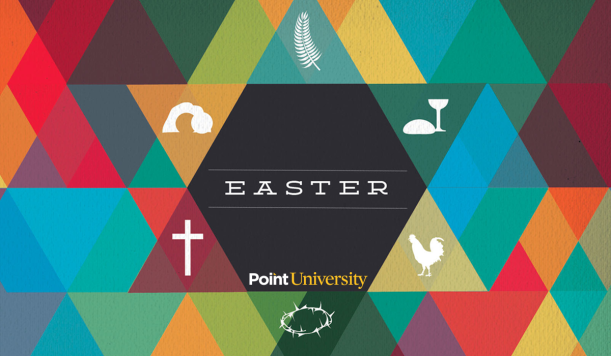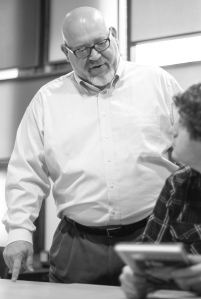
“Me, write a blog? Really? I do not even read blogs. I am not even sure what they are!” That was my initial internal response to the invitation to write the Easter edition of our university’s ongoing blog. I had to wiki what a blog is–a kind of free form short journal of one’s thoughts on a subject and posted on the World Wide Web. That intense research yielded the discovery that there is an estimated nearly 300 million blogs out there! I was stunned! That is a lot of competition. I have to get away from my manual typewriter more.
When I was asked to write the “Easter edition” blog, there was no way I could decline, especially since I am teaching a class on the Resurrection Narratives of Jesus this semester at Point.
In preparation, I read a few blogs, confirming to me that a blog entry is not to be a mini doctoral dissertation, just some free form thoughts on a topic.
Easter? What does it mean? I can tell you. I am an expert. I have experienced 54 Easters and will be on number 55 next Sunday. Easter means…
Chocolate bunnies, candy-filled baskets, colored eggs, Peter Cottontail hopping down the bunny trail. Egg hunts. And most importantly, Easter means Peeps! (While I no longer eat chocolate bunnies, neither receive a surprise Easter basket, nor participate in egg hunts, I must confess to eradicating from the world several (maybe more) regular boxes of Peeps annually. There is just something special about biting the head off of a marshmallow chicken that says “Easter” as no other moment can. And, the sugar coating is nice too! Sometimes students bring me Peeps, especially after Easter when they are discounted. (Special Note: Several years ago one student brought to class for me a large shopping bag full of peeps after Easter. I still wonder if he was being gracious or trying to kill me just before finals.) In the last weeks several students have brought me Peeps to class, seeking to garner favored status. My academic integrity cannot be bought, even for Peeps (making that clear before I accepted and ate them).
The Early Days
Like many persons who did not grow up in a Christian home, and like many who do, I did not discover the true meaning of Easter until my later teens. Though not Christians, we still had Easter traditions every year: the not-so-surprise Easter baskets filled with candy and some small toys, a life-size hollow chocolate Easter bunny, some cheap paddles with a ball on an elastic string attached to it. (Once the elastic connector broke, Mom co-opted the paddles for attitude adjustment therapy for my siblings and me. I hated those paddles.).
Our Easter tradition? Once we were sugared up for breakfast, we would pack up the 1964 Dodge station wagon and go… fishing. I guess if the Easter bunny stiffed us, we would have hunted him down instead of fishing. To be fair, mom and dad did take all five of us kids to one Easter church service when I was about six. It did not work out so well, so we went back to the tradition of fishing. In my senior year, mom and dad became Christians… and their Easter traditions expanded.
It was not until my latter teens that I discovered what Easter was really about-celebrating the early Sunday morning Resurrection of Jesus from three days in the grave! Not just believing, but celebrating! (Though I have experienced a few Easter worship services that lacked any semblance of enthusiasm, those congregations seemed focused on re-enacting the Friday funeral of Jesus on Easter Sunday morning rather than celebrating His Sunday morning resurrection. If you like funerals, I must interject that they were outstanding examples.)
Since then, I have discovered differing ways Christians celebrate Easter.
New Traditions
Some will get up long before sunrise on Easter Sunday to get themselves ready for a Sunrise Service, often taking place outside on the church parking lot or in a park exactly at sunrise. (I have known some congregations to stay inside the church building and have the “sunrise service” at 9:00 a.m., a much warmer option.)
One of the Easter traditions still observed by some Christians in the Russian Orthodox Church consists of lavishly or simply decorating Easter eggs and cooking loaves of Easter bread, then leaving both at the graves of deceased relatives as a witness that Jesus has risen. (No, the children do not hunt for the eggs in the cemetery.)
Another Christian Easter tradition subscribed to by some is the planting of seeds or a small garden on Easter. The planting signifies the burial of Jesus, and the growth to come signifyies Jesus’ resurrection from the tomb.
The Real Reason
There are two Easter holidays I experienced that I remember in particular. I preached in the U.S. one Sunday, flew to Russia, and preached Easter again the next Sunday south of Moscow. I did not realize until then that Easter for the Orthodox Church calendar is some years celebrated on a Sunday differing from those of us in the West. I was pretty excited thinking I would get a second set of Peeps that year. But, it was more powerful for me in that I was blessed with two back-to-back Resurrection Sundays!
Each Easter we have much to celebrate into eternity (which is a lot longer than a chocolate bunny lasts.) In the Apostle Paul’s crystal clear concise treatise on The Resurrection, the fifteenth chapter of his first letter to the Corinthians, Paul writes:
“(20) But in fact Christ has been raised from the dead, the firstfruits of those who have fallen asleep. (21) For as by a man [Adam] came death, by a man [Jesus] has come also the resurrection of the dead” (ESV).
Allow me to briefly unpack Paul’s words. Jesus was raised from the dead and so shall his followers one day be raised from the dead, when He returns the second time. For me that means not only will I be resurrected from the impermanent grave, but so will others now passed away with whom Jesus and I have common love: my father “Big Bill,” my mother-in-law, Lois, my little brother Brad, who died 14 months ago, and so many other saints precious to you and me. It means every time we stand on a dark and stormy day of grief at another graveside of a loved one that shared our faith in Jesus, that the second date on the tombstone is temporary. Each Easter is a celebratory reminder of past and future, and a salve for the wounded heart.
I am hoping some of you will post comments, and in those comments you will post an answer to this question:
“What is the Easter tradition which most facilitates your celebration of the resurrection of Jesus?”
This next Sunday, Easter Sunday, what will be your tradition? Will your traditions put the celebration of the resurrection of Jesus at the forefront?
 Billy Strother, Ph.D.
Billy Strother, Ph.D.
Professor of Preaching and New Testament



